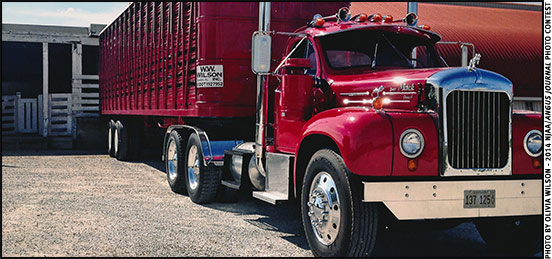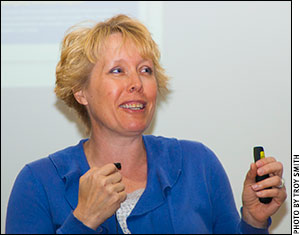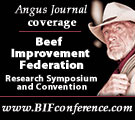
Transportation Standards
Canadian Livestock Transport could be model for United States.
Canada’s multispecies livestock transportation training and certification program could be the model for a similar program in the United States. Alberta-based livestock-handling specialist Jennifer Woods provided an overview of Canadian Livestock Transport (CLT) during the Cattle Transportation Symposium May 14-15 in Fort Collins, Colo. Also present was Texas A&M University Meat Scientist Dan Hale who talked about progress toward developing a program for certifying U.S. livestock transporters.

Jennifer Woods said an important aspect is learning to determine, prior to loading, if animals are fit for transport. She said the transport of unfit animals puts animal welfare and public perception of the livestock industry at risk.
Calling it the product of industry-led initiative, Woods said CLT began as an Alberta-only program that has spread throughout Canadian provinces. CLT is a standardized, comprehensive training course, offering species-specific training modules for handlers and haulers of cattle, hogs, sheep, poultry and (meat) horses.
According to Woods, participants learn how stress impacts animal welfare and health, but also meat quality. They learn principles of animal behavior and low-stress handling, with particular attention to loading and unloading. Participants also learn emergency response procedures and are educated regarding Canadian regulations pertaining to livestock transportation.
Woods said an important aspect is learning to determine, prior to loading, if animals are fit for transport. She said the transport of unfit animals puts animal welfare and public perception of the livestock industry at risk.
Upon completion of CLT training and payment of a $375 fee, participants become “certified.” Certification must be renewed after a period of three years. CLT Verified is an online tool through which driver certification can be verified.
“CLT is not limited to drivers. It is for anyone involved, from those preparing animals for transport to those who act as caregivers after animals are delivered,” explained Woods. “We wanted this to be real training, so we use independent instructors — not in-house trainers hired by trucking firms. This is not just window dressing.”

Dan Hale said movement toward a U.S. program similar to CLT would require establishing an entity to be responsible for organization and administration.
Dan Hale said the U.S. beef industry needs to champion the evolution of a program for certification of cattle transporters. He explained how the Master Cattle Transporter (MCT) training program was developed as part of the Beef Quality Assurance initiative, through funding by the beef checkoff. MCT offers a printed manual, DVD or online education options for self-training of participants. But MCT is less extensive than the more formal and government recognized Canadian program.
Hale said movement toward a U.S. program similar to CLT would require establishing an entity to be responsible for organization and administration. A decision would have to made regarding funding, whether to follow Canada’s certification fee-based example or use a different method. Politics, said Hale, makes moving forward complicated. He also warned that livestock transportation is likely to come under increasing regulatory scrutiny.
“We need a certification program. We need to have it rolling to get in front of the regulatory freight train that we can expect to come our way,” stated Hale.

Editor’s Note: Troy Smith is a freelance writer and cattleman from Sargent, Neb.





